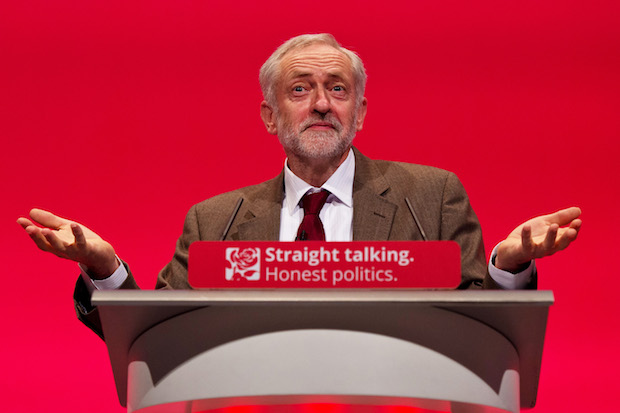If you wanted evidence to support the repeated assertion from Labour MPs that Jeremy Corbyn cannot continue as Labour leader, today’s Trident debate offered it in cartloads. The vote, which had been promised in 2007 by a Labour defence secretary, is supposed to be about the renewal of the submarines that carry the nuclear warheads. But today’s debate was more about the deep split within the Labour party over the matter, and the contempt with which so many Labour backbenchers view their leadership.
In most parliamentary debates led by the leaders of the two main parties, what normally happens is that backbenchers intervene on their respective leaders to offer supportive statements that, as much as anything else, allow them to catch their breath and refine their argument. In this debate, Corbyn was repeatedly intervened on by Labour MPs furious that he was refusing to read out the party’s official policy on Trident renewal, which is as follows:
‘Labour remains committed to a minimum, credible, independent nuclear capability, delivered through a Continuous At-Sea Deterrent. We will actively work to increase momentum on global multilateral disarmament efforts and negotiations, and look at further reductions in global stockpiles and the numbers of weapons.’
This fury might be rather insincere, given this has never been Corbyn’s own policy and given he had essentially rendered Trident useless in any government led by him by saying within weeks of winning the Labour leadership that he would never press the nuclear button. But as Neil Coyle, an MP who nominated Corbyn for the leadership, pointed out, it was agreed at Shadow Cabinet that Labour Party policy would be read out from the frontbench during this debate. Coyle asked when this was going to happen, and Corbyn replied rather irritably that he knew what party policy was. Thus the Labour leader wasn’t just setting himself against party policy, he was also going back on an agreement reached with his party about how it would conduct himself in this debate. Jamie Reed, Angela Smith and Kevan Jones also joined in with the backbench criticism, leading Corbyn to turn to the SNP and Green Party for support in their interventions.
Even if you agree with the Labour leader that unilateral disarmament is the best way to rid the world of nuclear weapons, it is difficult to watch this afternoon’s debate and conclude that he can lead a united Labour party, or that he is trying to keep it united when he is reneging on recent agreements.
The frontbench speeches in this debate debate provided the political embarrassment for Labour that the Tories had hoped for, and Theresa May was clearly keen to encourage that impression. She told Caroline Lucas that she and some Labour MPs were often ‘the first to defend the country’s enemies’ which drew gasps from the benches around her. Then she drew loud, theatrical shouts of ‘WOW’ from SNP MPs when she said ‘yes’ very bluntly in response to a question about whether she was prepared to authorise a strike that would kill millions of people. But the debate so far has been as much about Labour’s terrible mess as it has been about the case for renewal.







Comments